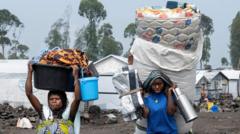In a significant crackdown on illegal mining, authorities in the Democratic Republic of Congo (DRC) have arrested three Chinese nationals who were found in possession of a staggering $800,000 in cash and 12 gold bars. This operation, led by South Kivu province's governor Jean Jacques Purusi, was executed discreetly due to heightened tensions after the controversial release of a prior group of Chinese nationals accused of illegal mining activities.
Chinese Nationals Detained With Cash and Gold Bars in DR Congo

Chinese Nationals Detained With Cash and Gold Bars in DR Congo
Three Chinese individuals were apprehended in the Democratic Republic of Congo with $800,000 in cash and gold bars, raising concerns over illegal mining operations in the region.
Located in eastern DRC, known for its vast mineral wealth, the region has long been afflicted by instability and violence, primarily driven by militia groups vying for control over lucrative resources. Purusi confirmed that the cash and gold were discovered after a thorough inspection of the suspects' vehicle in the Walungu area, close to the Rwandan border. He indicated that certain dealers in precious metals maintain connections with powerful figures in Kinshasa, which may have necessitated the secretive nature of this arrest operation.
The troubling trend of foreign exploitation of DRC's mineral resources, dating back to colonial times, persists today. Recently, tensions escalated in the neighboring North Kivu province, where a Rwanda-backed rebel group has gained significant territory. DRC has also initiated a lawsuit against Apple for allegedly utilizing "blood minerals" in their supply chain, asserting that these resources contribute to ongoing violence and severe human rights violations in conflict areas.
Concerns are mounting as the Chinese embassy has yet to respond to the recent arrests and allegations surrounding previous illegal activities. This latest seizure could represent a pivotal moment in the DRC's ongoing efforts to clean its mineral sector of corruption and illicit trade.
The troubling trend of foreign exploitation of DRC's mineral resources, dating back to colonial times, persists today. Recently, tensions escalated in the neighboring North Kivu province, where a Rwanda-backed rebel group has gained significant territory. DRC has also initiated a lawsuit against Apple for allegedly utilizing "blood minerals" in their supply chain, asserting that these resources contribute to ongoing violence and severe human rights violations in conflict areas.
Concerns are mounting as the Chinese embassy has yet to respond to the recent arrests and allegations surrounding previous illegal activities. This latest seizure could represent a pivotal moment in the DRC's ongoing efforts to clean its mineral sector of corruption and illicit trade.




















